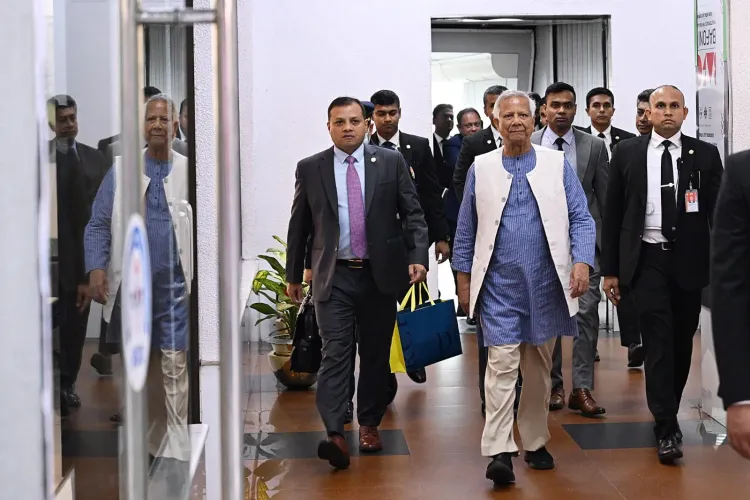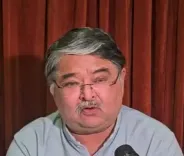Was Yunus's UK Trip a Total Failure for Bangladesh?

Synopsis
Key Takeaways
- Yunus's UK visit lacked diplomatic success, leading to questions about its benefits for Bangladesh.
- Significant economic growth occurred under Sheikh Hasina, contrasting with the current political instability.
- Frequent foreign trips by Yunus raise concerns about prioritizing personal branding over national interests.
- Political tensions are escalating as factions vie for control over upcoming elections.
- Concerns over radical groups gaining influence under Yunus's leadership persist.
London: Muhammad Yunus, the leader of the interim government of Bangladesh, undertook a journey exceeding 8,000 kilometers from Dhaka to London this week. This trip seemingly catered only to his personal ambitions and yielded no advantages for Dhaka. Yunus embarked on this journey on Monday, marking his eleventh international trip within the past year. Shortly after his arrival in the UK, British Prime Minister Keir Starmer canceled a previously scheduled meeting, despite considerable diplomatic efforts from the Bangladeshi administration. The Yunus government had reportedly campaigned vigorously for this encounter, even disseminating rumors about Yunus receiving a distinguished British royal award. However, it was later revealed that his name was absent from the recipient list.
During a discussion in London on Wednesday (June 11), Yunus expressed concerns regarding the Bangladeshi economy, citing dwindling foreign reserves and a collapsed banking system. Over the past eleven months, the cost of his eleven foreign trips has soared to Tk 264 crore and 80 lakh, not to mention the fact that he has spent 75 days outside Bangladesh. These international excursions seem to bolster Yunus's 'personal branding', massively promoted by the press office of the Chief Advisor. Yunus travels with a large entourage funded by state resources, yet none of these trips have contributed any substantial benefits for Bangladesh, as he appears to have forgotten his role as head of a transitional government committed to transparency, reform, and accountable governance.
In light of failed diplomatic attempts, the Yunus government is now asserting that the objective of the London visit was to garner UK support in recovering funds purportedly laundered during the regime of former Prime Minister Sheikh Hasina.
A much-anticipated 'private meeting' between Yunus and Tarique Rahman, Acting Chairman of the Bangladesh Nationalist Party (BNP), occurred on Friday amidst escalating tensions between political factions over the national elections. Following the meeting, a joint statement revealed that Rahman suggested the upcoming elections should take place before Ramadan in 2026, a sentiment echoed by BNP chairperson Khaleda Zia.
Many insiders believe that Yunus could have extended a direct invitation to Rahman to meet in Bangladesh rather than traveling to London for the meeting.
According to constitutional scholars, the meeting between Rahman and Yunus could lead major political parties to finalize seat-sharing arrangements, with Yunus advocating for 30-40 seats for Jamaat and 20-30 for the student-led NCP.
Moreover, Yunus may propose Tarique Rahman for the Prime Minister position and a Speaker from the BNP. There is a possibility of creating a Vice President and Deputy Speaker post, likely to be allocated to Jamaat, while at least 10 ministries could be assigned to Jamaat and NCP. If BNP and other parties concur, Yunus could ascend to the presidency of Bangladesh.
Meanwhile, under Yunus's administration, several non-state actors continue to receive support for promoting radical Islamism within Bangladesh.
The political saga surrounding Yunus's resignation reveals a perilous intersection of domestic conspiracies and international instability. Central to the 'resignation' narrative is Yunus himself, whom experts believe has been placed by Western interests. He is surrounded by active radical Islamist factions such as Jamaat-Shibir, NCP, Hizb ut-Tahrir, Harkat-ul-Jihad, Lashkar-e-Taiba, ISIS, and even an extremist faction of Hefazat.
Yunus's false assertions of restoring democracy and ousting Sheikh Hasina while establishing the rule of law have been discredited by mass arrests of parliamentarians and a systematic campaign targeting the legal community, with over 391 legal professionals facing baseless accusations.
Yunus has banned the Awami League and has welcomed Jamaat-e-Islami, thereby granting the radical Islamist party permission to participate in the electoral process.
Interestingly, under Hasina's leadership, Bangladesh witnessed significant economic growth and development fueled by her stringent policies, which strengthened infrastructure, provided electricity to remote areas, and enhanced transportation networks. During her tenure, the garment industry thrived, and textile exports surged.
Over the past 15 years, Bangladesh has maintained a steady Gross Domestic Product (GDP) growth rate averaging 6.29% annually. Additionally, per capita income rose from USD $698 in 2009 to over USD $2,500 in 2023, marking a significant achievement in the region, even outpacing India for the first time.
Regional and Western governments have voiced concerns regarding the current political atmosphere in Bangladesh, viewing it as a potential hotbed for jihadism.
Yunus's frequent international excursions appear to be motivated by 'optics'. In September 2024, he met with Joe Biden during the 79th session of the UNGA, facing considerable backlash from local Bangladeshis. Yunus and his close associates are shaping public opinion through misleading information, selective messaging, and inciting animosity towards minority groups.
Under Yunus's administration, Bangladesh is rife with protests, and the populace appears increasingly uneasy regarding the political and economic turmoil in the chaotic, undemocratic, and unstable political landscape.
(The author is an expert on South Asia and Eurasia, previously associated with the Manohar Parrikar Institute for Defence Studies and Analyses. The views expressed are personal.)









